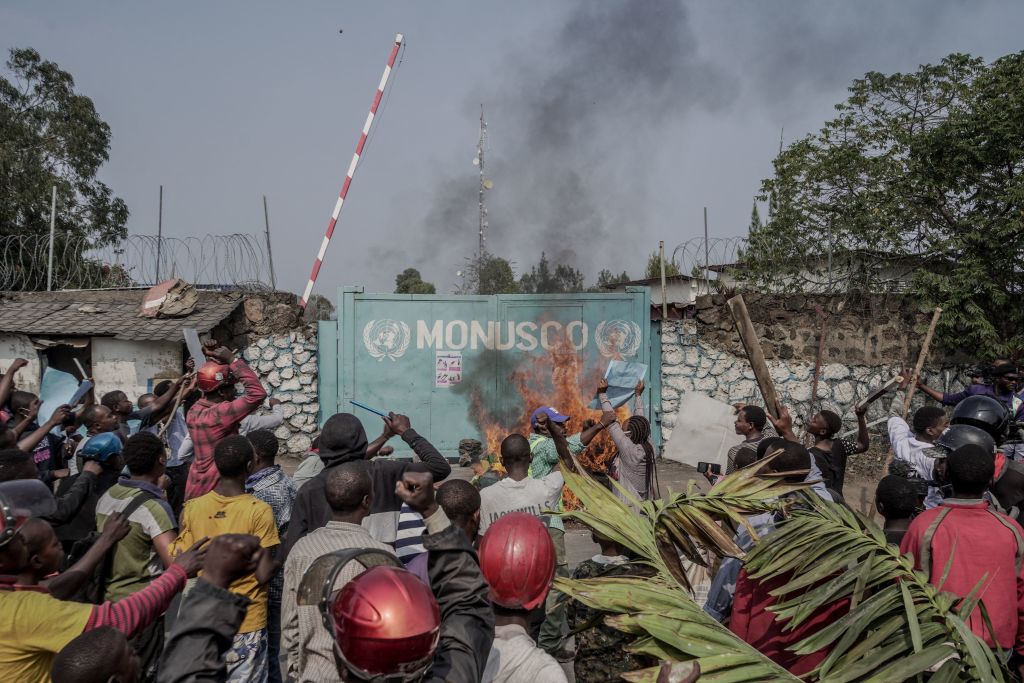ADF STAFF
Fabrice Kighoma was dismayed last December when he heard that the United Nations renewed the mandate for its peacekeeping mission in the Democratic Republic of the Congo (DRC).
“For me, personally, this is bad news and it hurts me a lot,” the Congolese activist based in Goma told online magazine International Politics and Society Journal.
The mission, known as MONUSCO, is unpopular with some Congolese civilians and officials who blame it for failing to pacify the DRC’s violence-plagued eastern provinces.
On June 19, MONUSCO and the DRC jointly announced the mission’s withdrawal when its mandate expires in December 2023.
“MONUSCO’s departure has already begun, but there must be a dignified and peaceful withdrawal,” mission chief Bintou Keita said. “You don’t dismantle a mission in a day.”
Patrick Muyaya, Congolese Minister of Communication and Media, said the government granted the request for MONUSCO’s withdrawal “on the basis of the achievement of the minimum conditions of the most important milestones of the transition plan.”
However, he would not specify a date by which the mission will end.
“There may be several unforeseen [circumstances] and imponderables,” he said.
With 12,800 troops deployed in eastern DRC, MONUSCO is one of the largest peacekeeping missions in the world. It also is one of the most expensive, with an annual cost of about $1 billion.
U.N. peacekeepers have been in the region since 1999, but the resurgence of the M23 rebels in eastern DRC since late 2021 has triggered mass displacement, death and hostility towards the mission.
In 2022, MONUSCO was the target of a series of protests in which 32 civilians and four peacekeepers died in eastern DRC.
Richard Moncrief, the African Great Lakes Region director for the International Crisis Group think tank, said the U.N. mission has failed to earn civilians’ trust.
“In this situation in eastern Congo — as in Mali — when thousands of well-equipped troops can’t seem to do anything to protect the population, it raises suspicions in people,” he told the German international broadcaster Deutsche Welle (DW).
“MONUSCO has largely failed because its deployment has not had a significant impact on security over the past decade,” Moncrief said.
Unhappy with MONUSCO for years, the Congolese government requested the deployment of the East African Community Regional Force (EACRF), which poured thousands of troops into the region between November and April.
Within months, however, President Felix Tshisekedi voiced complaints that the force refused to engage M23 with force. He called on the Southern African Development Community to deploy another regional force to fight the rebels in eastern DRC.
Remadji Hoinathy, a fellow at the South Africa-based Institute for Security Studies, said too many military forces could be problematic.
“There’s almost a logjam there,” he told DW. “These forces need to clarify how they can cooperate with each other.”
In the meantime, MONUSCO will continue to try to maintain peace while it remains in the DRC, Keita said.
“MONUSCO remains engaged in all regional processes for the return of peace in eastern DRC and, consequently, the return of thousands of displaced people to their places of origin,” she said.
In briefing the U.N. Security Council on June 26, Assistant Secretary-General for Africa Martha Ama Akyaa Pobee lauded a recent lull in fighting between M23 rebels and the Congolese national army (FARDC).
A week earlier, MONUSCO, the EACRF and the expanded Joint Verification Mechanism conducted a reconnaissance mission to Rumangabo base in North Kivu to assess conditions for beginning the process of disarming and demobilizing M23.
“For these efforts to bear fruit, it is urgent that the M23 withdraw completely from the occupied territories, lay down its arms unconditionally,” she said.
Pobee cautioned that the overall security situation in eastern DRC has continued to deteriorate since April.
As the FARDC has redeployed to North Kivu province, armed groups in Ituri province to the north have rushed into the void. The Allied Democratic Forces, CODECO and the Zairean militia have killed more than 600 people there in the last three months.
DRC officials blamed CODECO for killing 46 people, half of them children, in a June 11 attack on the Lala displacement camp, about 3 kilometers from a U.N. peacekeeping base in the town of Bule.
The increased violence in Ituri signifies how the U.N. mission’s departure would be fraught with challenges, Pobee said.
“MONUSCO’s withdrawal must not compromise the protection of civilians,” she warned. “We must avoid creating security vacuums.
“An orderly and responsible transition depends on the ability of national security forces to deploy and respond effectively wherever the security situation requires it.”

